Food for thoughts
Dec. 24, 2020
Thesaurus : 02. Lois
Full reference: Loi n° 2020-1672 du 24 décembre 2020 relative au Parquet européen, à la justice environnementale et à la justice pénale spécialisée (Law of 24 December 2020 on the European Public Prosecutor's Office, environmental justice and specialized criminal justice)
Dec. 22, 2020
Thesaurus : Juridictions étrangères diverses
► Full Reference: Supreme Court of Norway, 22 December 2020, People v Artic Oil.
____
🏛️Read the judgment (in English, unofficial translation)
________
Dec. 9, 2020
Thesaurus : Doctrine
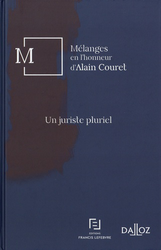
Référence complète : Dezeuze, E. , La proportionnalité des sanctions administratives en matière économique et financière, in Mélanges en l'honneur d'Alain Couret, Un juriste pluriel, Editions Francis Lefebvre et Dalloz, 2020, pp.683-701.
Consulter la présentation générale de l'ouvrage dans lequel cet article a été publié.
Dec. 8, 2020
Thesaurus : Doctrine

► Référence complète : S. Menétrey, "Le contentieux économique", in J.-B. Racine (dir.), Le droit économique au XXIe siècle. Notions et enjeux, LGDJ, coll. "Droit & Économie", 2020, pp. 173-209
____
📕consulter une présentation générale de l'ouvrage, Le droit économique au XXIe siècle. Notions et enjeux, dans lequel cet article est publié
____
► Résumé de l'article :
____
🦉Cet article est accessible en texte intégral pour les personnes inscrites aux enseignements de la Professeure Marie-Anne Frison-Roche
________

Updated: Dec. 3, 2020 (Initial publication: July 15, 2020)
Publications
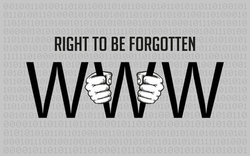
Full Reference : Frison-Roche, M.-A., Rights, primary and natural Compliance Tools, Working Paper, July 2020.
This Working paper is the basis for an article published in the collective book Compliance Tools .
____
There was a time when Regulatory techniques were above all only calculations of the best tarifications, taken up by monopolistic companies, while Compliance techniques were only obedience to all rules governing us. All this could therefore only be business of abacus and badine, used by engineers and consisted only of mechanical reflexes of "conformity" to all kinds of rules with the corset ensuring that everyone is bent in front of them
Systems have since evolved to integrate these prerogatives of each person: rights. Is this evolution really acquired? Maybe more effectively in Regulation Law than in its extension which is Compliance Law. This may be surprising since Compliance Law, in that it extends Regulatory Law in enterprises should, on the contrary, promote rights by meeting the enterprise, which is a group of people ....
In addition, if Regulation has long been the subject of a branch of Law in which rights have full place, the presentation of Compliance as "conformity", that is to say the proven assurance of obedience to all the applicable rules, leaves no space for the prerogatives of people, which appear rather as resistance to the obedience that would be expected of them. There again, the expectation of what would be a good ratio of conformity between behaviors and prescriptions would be obtained by a "design", data processing being the new form of calculation, improved by precision tools where the being human is not required
It would therefore be with regret, and probably because some constitutional jurisdictions still attach some value to fundamental rights that the systems of "conformity" of behavior to the rules make some room for the prerogatives of people, their more essential rights. It is sometimes said that this is part of the cost. It would therefore be as by "forcing" that rights would exist in Compliance systems, a kind of price that the effectiveness of Compliance must pay as a tribute to the Rule of Law principle
If in a poor definition Compliance is conceived in this only "conformity", leading to a landscape in which the behaviors of the people adjust to the rules governing the situations, Compliance being only the most "effective way" to ensure the application of the rules, in a mechanical perspective of Law, then it would effectively be necessary to reduce the prerogatives of people to a minimal part, because any "additional cost" is intended to disappear, even if it is produced here by constitutional requirements. In the looming battle between the effectiveness of the application of rules and the concern for the legal prerogatives of people who should above all obey and not claim their rights, especially their right not to obey , or their right to keep secret in Compliance techniques which is based on the centralization of information, the effectiveness of efficiency could only, by the very power of this tautology, prevail
The defeat would not be total, however, collaboration would still be possible and active between people availing themselves of their rights and Compliance Law. Indeed, in many respects, if rights have been recognized in Compliance systems, it is not only because Compliance Law, like any branch of Law, can only be deployed with respect for fundamental rights. kept by fundamental legal texts, but also because of the effectiveness of rights as " Compliance Tools".
Indeed, because they constitute a very effective "tool" to ensure the entire functioning of a system whose goals are so difficult to achieve, because every effort must be made to achieve these goals, the public authorities not only rely on the power of crucial operators, but also distribute prerogatives to people who, thus encouraged, activate the Compliance system and participate in the achievement of the "monumental goals". Rights can prove to be the most effective tools to effectively achieve the goals set, to such an extent that they can be considered as "primary tools" (I).
But it is necessary to be more ambitious, even to reverse the perspective. Indeed because all the Monumental Goals by which Compliance Law is defined can be reduced to the protection of people, that is to say to the effectiveness of their prerogatives, by a mirror effect between rights. given by Law to persons and the rights which constitute the very purpose of all Compliance Law, in particular the protection of all human beings, even if they are in a situation of great weakness, rights become a "natural tool" of Compliance Law (II).
Rights are the Compliance Law future.
Contre cela, la critique radicale, savante et fondée d'Alain Supiot, dans l'ensemble de son oeuvre et plus particulièrement dans La gouvernance par les nombres, 2015.
Sur la définition de l'entreprise comme un groupe de personnes qui se réunissent pour entreprise, v. le travail de référence d'Alain Supiot, par exemple son article d'introduction "L'entreprise...", dans l'ouvrage qu'il a dirigé L'entreprise dans la mondialisation ...., 2015 ...
Si l'entreprise pouvait renaître comme idée de cristallisation d'une idée commune entre des personnes, naturellement titulaires de droits subjectifs, exerçant ensemble leur liberté d'entreprendre pour réaliser un projet commun, ce qui correspond à la définition classique du contrat d'entreprise donnée à l'article 1832 du Code civil, cela renforcerait considérablement la présence des droits subjectifs dans le Droit de la Compliance et conforterait la nature humaniste de celui-ci.
En outre, dans une telle définition la loi de la majorité, qui n'est qu'une loi de fonctionnement d'une catégorie de sociétés que sont les sociétés de capitaux, deviendrait moins puissante, au profit des "droits propres" de tout associé (au-delà du cercle des sociétés de personnes), sans qu'il soit besoin d'aller chercher au-delà du cercle des associés ou titulaires de titres émis par la société ou l'entreprise (dit shareholders) et d'aller donner le "droit à la parole" à des personnes qui, parce qu'elles sont "concernées" (les "parties prenantes", les skateholders) ont désormais de plus en plus le "droit à la parole".
La Compliance by Design reflète ces tensions. Elles sont particulièrement bien décrites par Cécile Granier. V. ....
Contre cette conception de la légalité, qui prévoit tout et à laquelle il faudrait prouver par avance et que l'on se "conforme" entièrement, ce qui est contraire aux principes mêmes du libéralisme dont le principe est la liberté d'agir et non pas l'obéissance, Carbonnier affirme que les règles sont faites ne pas s'appliquer et qu'elles ne sont que le "mince vernis" des choses, qu'il convenait de se méfier de la "passion du Droit". V. not. son dernier ouvrage Droit et passion du droit sous la Vième République, 1995. Carbonnier est considéré comme le plus grand juriste français du XXième siècle. Il rédigea les lois qui réformèrent en profondeur le Code civil et publia des ouvrages sur "l'art législatif".
Au contraire, l'Etat de Droit n'est pas un coût extérieur au système de Compliance efficace, que celui-ci doit internaliser. Il est le fondement même du Droit de la Compliance. Voir dans ce sens la démonstration faite par le président de la Cour de Justice de l'Union européenne, Koen Laearnt, ..., in Pour une Europe de la Compliance, 2019.
Sur la démonstration comme quoi la Constitution, en ce qu'elle contient de l'incalculable, est broyée dans cette façon de faire, v. Alain Supiot, Intervention 2019.
Dec. 1, 2020
Newsletter MAFR - Law, Compliance, Regulation
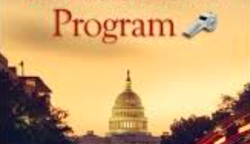
Full reference: Frison-Roche, M.-A., New SEC Report to Congress about Whistleblower Program: what is common between American and European conception, Newsletter MAFR - Law, Compliance, Regulation, 1st of December 2020
Read by freely subscribing other news of the Newsletter MAFR - Law, Compliance, Regulation
Summary of the news
Like every year since the adoption of the Dodd-Frank Act, the Securities and Exchanges Commission (SEC) and especially its Office of the Whistleblowers (OWB) handed to the Congress of the United-States a report about the success of its program concerning whistleblowers, especially estimated with the amount of financial rewards granted to them during the year. This report especially presents the amount granted to whistleblowers, the quality of the collected information and the efficacy of SEC's whistleblowers' protection process.
If Americans condition the effectiveness of whistleblowing to the remuneration of whistleblowers, Europeans oppose the "ethical whistleblower" who shares information for the love of Law to the "bounty hunter" uniquely motivated by financial reward and favor the former to the later, as it is proven in the French Law Sapin II of 2016 (which do not propose financial reward to whistleblowers) or the British Public Interest Disclosure of 1998 (which just propose a financial compensation of the whistleblower's losses linked to whistleblowing).
However, American and European conceptions are not so far from each other. As United-States, Europe has a real care for legal effectivity, even if, because of their different legal traditions, Americans favor effectivity of rights while European favor effectivity of Law. If it places effectivity at the center of its preoccupations, Europe should conceive with less aversion the possibility to financially incite whistleblowers. Moreover, United-States and Europe share the same common willingness to protect whistleblowers and if rewarding would enable a better protection, then Europe should not reject it, as shows the recent declarations of the French Defenders of Rights. It is not excluded that both systems converges in a close future.
Nov. 27, 2020
Thesaurus : Doctrine
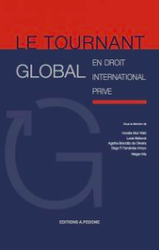
Full reference: Lagarde, P., Preface of Le tournant global en droit international privé, Muir-Watt, H., Biziková, L., Brandão de Oliveira, A., Fernández Arroyo, D. P., Ma, M. (ed.), Editions Pedone, 2020, pp. 9-14
Nov. 25, 2020
Thesaurus : 02. Cour de cassation
Full reference: Cour de Cassation, Chambre criminelle, 25th of November 2020 (18-86.955), Decision n°2333, société Iron mountain France SAS
Read the press release from the Cour de Cassation (in French)
Read the explication note from the Cour de Cassation (in French)
Summary of the decision
In this decision constituting a case law reversal, the Chambre criminelle of the Cour de Cassation decides that the firm which absorbs the one to which are imputable facts which can receive a penal qualification leading to penalties of fines has the aptitude to answer penally.
The decision precises that this reversal is applicable only to future cases, to respect the principle of predicability, except if this merging was operated only to escape from criminal responsibility of moral persons.
This case is an example of the use of Criminal Liability Law as an incentive.
Nov. 19, 2020
Thesaurus : 03. Conseil d'Etat
► Full Reference: Conseil d'État (French Council of State), 6th and 5th chambers reunited, 19 November 2020, n° 427301, Commune de Grande-Synthe (so-called Grande-Synthe I).
____
🏛️read the decision (in French)
________
Nov. 18, 2020
Thesaurus : 02. Cour de cassation
Nov. 12, 2020
Thesaurus : Doctrine
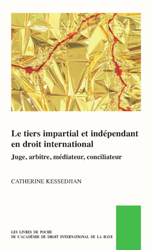
Full reference: Kessedjian, C., Le tiers impartial et indépendant en droit international. Juge, arbitre, médiateur, conciliateur, Académie de Droit international de La Haye, 2020, 769p.
Read the forth of cover (in French)
Read the table of content (in French)

Nov. 6, 2020
Publications

► Référence complète : M.-A. Frison-Roche, L'attractivité économique de l'impartialité juridictionnelle, document de travail, nov. 2020
____
🎥 Dans un premier temps, ce document de travail a servi de base à une intervention dans la conférence-débat présidée par le président François Ancel avec Madame la Conseillère Carole Champalaune, "L'office du juge, les enjeux économiques et l'impartialité", dans le cycle de Table-Ronde que la Cour de cassation organise sur le thème général de Penser l'office du juge.
____
📝 Dans un second temps et postérieurement à cette conférence, il avait vocation à servir de base à un article publié dans un ouvrage collectif. Il semble que ce projet n'ait pas abouti.
____
Présentation générale. Pour s'insérer dans l'ambition du cycle général de colloques qui est de "Penser l'Office du Juge" et dans celui-ci qui appréhende l'impératif d'attractivité économique de celui-ci, le propos dégage tout d'abord le rapport qui paraît contradictoire entre celui-ci et la distance que le juge doit conserver. Ainsi il est souvent affirmé que le juge devrait être à ce point internalisé dans les "places", notion économique de grande portée (à laquelle est consacrée la première partie de l'introduction, définissant la "place" à la fois comme un espace close et poreux et comme un "justiciable systémique") qu'il devrait ipso facto perdre sa distance, c'est-à-dire son impartialité. Comme les places sont en concurrence, même si l'on met en balance l'efficacité de la place, d'une part, et l'impartialité, d'une part, d'un juge qui lui est extérieur et se réfère au Droit, l'Impartialité en ressortirait nécessairement affaiblie. Il faudrait alors au cas par cas amener le juge à faire les concessions voulues.
Le propos vise à prendre la position contraire et poser que les places - notamment parce qu'il faut les distinguer fortement des marchés, dont elles furent les ancêtres - requièrent un juge, qui sont à la fois "singulier", c'est-à-dire avec une personnalité, un visage, des opinions, et en distance pour que sa fantaisie ne surprenne pas les places. En effet, celles-ci requièrent une justice humaine, et non pas mécanique et le juge singulier, dont le juge des référés ou l'arbitre sont l'épigone, répond à ce besoin. Mais pour réduire ces "marges de discrétion", façon dont l'économie qualifie l'impartialité d'une personne qui ne peut jamais être neutre, la façon de faire de ce juge doit être insérée dans des mécanismes qui diminuent ces marges. De cette façon, la place a alors un juge qui est toujours plus impartial, et ce faisant devient toujours plus attractive.
Pour obtenir cela en pratique, la place exprime deux attentes légitimes en tant que "justiciable systémique", dont la satisfaction accroit et l'impartialité du juge singulier et accroit l'attractivité de la place comme espace. Ce qui montre bien qu'attractivité de la place et impartialité du juge, parce qu'inséré dans des procédures et dans une institution et une famille juridictionnelle, ne sont non seulement pas contradictoires, mais sont au contraire convergents, l'un alimentant l'autre.
Concrètement, et la pratique juridictionnelle le montre, il faut consolider l’impartialité du juge singulier en l’insérant dans des processus collectifs. Comme il faut favoriser un rayonnement de l’impartialité par un renforcement de la « famille juridictionnelle ».
Pour consolider l'impartialité du juge singulier en l'insérant dans des processus collectif, il faut admettre sans hésiter la subjectivité du juge, la rechercher même, le juge des référés ou l'arbitre étant bien les épigones du juge adéquat. La réduction des marges de discrétion, définition de l'impartialité étant obtenue par l'insertion du juge dans une procédure dont il est seul le maître mais dans laquelle il n'est pas seul. Cela a pour conséquence technique qu'il est lui-même dans un débat contradictoire, non seulement pendant l'instance, mais encore avant celle-ci (dans les médias), par le jugement (et l'arrêt de la Chambre criminelle du 25 novembre 2020 est un modèle du genre) et après le jugement. En cela le juge montre que par son office il est dans le futur, comme le montrera la justice climatique. En outre pour limiter ses marges de discrétion, le juge singulier doit s'insérer dans un principe rationnel de cohérence, vertical et horizontal. Vertical parce qu'il intègre ce qu'il est dit et la technique de "l'avis déterminant" est à encourager, le juge singulier ne devant s'y soustraire que s'il a de "fortes raisons" pour le faire et selon cette règle générale Comply or Explain (qui est le contraire même de l'obéissance aveugle). Horizontal parce que le juge soit se tenir à ce qu'il a dit, l'estoppel étant elle-aussi une règle de logique. Mais surtout l'institution doit dégager le plus possible des "doctrines", par tous les moyens, dont les rapports annuels sont un exemple.
Pour consolider l'impartialité du juge singulier en renforçant la "famille juridictionnelle", il convient d'en avoir une conception plus large, ce qui pourrait mener à des "lignes directrices" communes à des juridictions diverses, et plus forte, en intégrant ceux qui entourent le juge pour mener jusqu'au jugement. En cela la procédure devant la Cour de Justice de l'Union européenne, travail sur un dossier commun, est un modèle. Si cette communauté était plus forte encore, l'office du juge rendrait un plus grand service encore qu'il ne fait déjà dans l'espace numérique.
Ainsi, des juges toujours humains, toujours divers, toujours singuliers, qui écoutent, considèrent et ajustent à la situation, qui au sein d'une famille juridictionnelle s'insèrent dans une doctrine institutionnelle qui les dépassent et les portent mais qu'ils transforment s'il y a une forte raison, toujours dite, pour ce faire : voilà l'impartialité incarnée rend ant une place économique et financière attractive.
Introduction. Quand j'ai choisi de consacrer quelques années à élaborer une thèse sur Le principe du contradictoire, en procédure civile, pénale et administrative, l'on m'avait conseillé de prendre un sujet plus étroit et moins basique. Quand j'ai été agrégée, l'on m'a conseillé de "passer aux choses sérieuses", c'est-à-dire au droit des affaires, mais c'est par une chronique de Droit processuel financier que j'ai débuté. Car ce lien entre la façon dont les juges progressent dans la façon de comprendre le cas (procédure) et arrivent jusqu'au moment de décider (jugement) est si fort avec la vie économique, comme les fils de chaine et les fils de trame, qu'on aurait bien tort de dissocier. Pour ma part je ne peux dissocier la solution trouvée et la façon d'élaborer celle-ci. D'ailleurs si les juristes anglais sont si précieux en droit des affaires, c'est sans doute parce que le contentieux leur coule dans les veines, que les techniques probatoires leur sont enseignées avec soin, que pour eux le juge est toujours virtuellement présent, assis à la table des négociations contractuelles, simplement actualisé si vient le temps du contentieux. De la même façon que Carbonnier disait que l'Etat est en France présent dans l'élaboration de tout contrat. Pour ne prendre qu'un exemple récent, quand je regarde comme tous les badauds les rebondissements de la saga Facebook, je mesure la dépendance dans laquelle et la Commission Européenne et cette entreprise que l'on dit toute-puissance sont par rapport au Président du Tribunal de l'Union européenne qui appliqua dans son Ordonnance du 29 octobre 2020 le principe du due process , lequel est la forme processuelle du droit au respect des données personnelles, pour réorganiser tout le mécanisme d'obtention des courriels échangés à l'intérieur de cette entreprise.
Pourtant quand j'écoute les représentants des grandes entreprises, ils ne semblent guère apprécier le Droit, qu'ils appellent généralement "réglementation", et encore moins les juges, ce qu'ils font et comment ils le font, c'est-à-dire leur office, les deux étant liés si l'on pose que "le juge applique la réglementation". Pour en rester à la perception des entreprises et sans entrer dans le sujet lui-même du rapport entre l'office du juge face à la loi
Mais si cela était si vrai, les entreprises cesseraient de tant vanter le modèle anglais, qui est décrit comme une sorte d'idéal dans presque chaque article, alors qu'il est si onéreux, ou le système américain, qui est si complexe dans son articulation entre les niveaux étatiques et le niveau fédéral que tout juriste américain est avant tout un processualiste.
L'idée est alors différente. Il ne s'agit plus de reprocher à la justice son inadéquation mécanique mais plutôt le fait qu'elle ne s'ajusterait pas aux besoins (avec le coût - accepté - de cet ajustement) du monde économique. En effet, le Royaume-Uni et les Etats-Unis seraient certes des sociétés juridictionnelles mais dans lesquels le juge aurait l'attitude adéquate : s'effacer derrière la loi des parties afin de mieux la servir. Les entreprises reprochent alors aux juges français ou allemand de ne pas suivre, participant en cela à ce qui serait ce grave défaut de l'Etat qui substitue sa volonté à celle des parties.
A lire divers travaux, les entreprises voudraient que l'Etat et ses juridictions se mêlent le moins possible de ce que les parties ont décidé tout en leur fournissent leur puissance au titre de ce principe de "sécurité juridique" portée au plus haut. Cette neutralité du principe de "sécurité juridique" qui utilise la force du Droit en lui ôtant pourtant la parole, utilisant le Droit et le juge comme des porte-voix, pose que les parties intéressées, qui sont les plus à même de mesurer leurs besoins et de construire les mécanismes adéquats, fassent leur "petite loi", puisque c'est par cette expression-là que Carbonnier désignait le contrat.
Mais comme dans le monde concret, l'idéal de l'ajustement contractuel pur et parfait n'existait pas plus que n'existe la concurrence pure et parfaite, un agent doit intervenir d'une façon neutre pour servir la petite loi quand l'autorégulation ne fonctionne pas, par exemple lorsque l'ajustement des intérêts ne perdure plus dans le temps. Comme Robespierre voulait un juge "bouche de la Loi", il faudrait un juge dont l'office serait d'être la "bouche du Contrat". Le juge anglais se définit sans doute ainsi, associant étroitement Impartialité et non-immixtion dans le contrat. Un juge non intrusif, qui jamais ne décide mais toujours sert.
C'est bien cette grille de lecture que le professeur d'économie d'Harvard a utilisé pour élaborer le classement Doing Business, qui mesure l'attractivité du Droit et du Juge, c'est-à-dire son aptitude à permettre aux entreprises, grandes ou petites, de se développer. Guy Canivet dans l'ouvrage qu'il co-dirigea à ce propos
Pourtant, cela non plus ne doit pas être si vrai, et l'association entre Impartialité et non-immixtion dans la situation initiale soumise au juge ne doit pas être si exacte, quand on entend par ailleurs tant de compliments argumentés adressés au Conseil d'Etat dans son appréhension du contentieux économique, que la suggestion est faite par des entreprises de lui en transférer la totalité de la connaissance, par exemple en matière de régulation financière et bancaire. Il ne paraît pourtant pas un juge effacé.
Mais c'est peut-être à force de lire les travaux d'Analyse Economique du Droit qui sont construits sur cette conception-là, que l'on finit par les recopier et peut-être y adhérer, souhaiter un juge qui ne dise jamais non, un juge mécanique. D'ailleurs ce que l'on appelle l' "intelligence artificielle" promet cela. Dans une justice non-humaine, la machine assure que la décision est prise avec une automaticité qui garantit une absence de parti-pris. Qui n'a pas d'âme ne peut être corrompu, qui n'a pas de raison ne peut se tromper. Cette passion actuelle pour les algorithmes, reposant sur la confiance faite aux machines et la défiance faite aux êtres humains, qui demeure les juges, repose sur un idéal de justice infaillible. Mais là encore c'est une erreur que d'associer Impartialité et Infaillibilité
Cette neutralisation du juge par les machines est généralement approuvée par les travaux. Elle n'est pourtant que le dépend de la solution plus artisanale et sanctionnée pénale consistant à neutraliser le juge par la corruption ; c'est un système juridique bien attractif que celui dont on est directement propriétaire... Mais les études montrent l'inefficacité économique pour une place de la corruption. Même si l'on laisse de côté l'appréciation morale de la corruption, l'effet sur l'image, etc., même si l'on imagine des entreprises qui n'adhèrent pas à "L'amour des Loi" posée par Rousseau, qui ne distinguent pas entre leur intérêt et leurs obligations - ne suivant les obligations que si elles ont un intérêt à le faire, la volonté du juge ne jouant plus alors que dans le jeu des incitations, qui placent le Droit et le Juge, comme des éléments de l'environnement des entreprises, il a été montré que les entreprises ne souhaitent pas un système juridique corrompu. La Commission Européenne a notamment publié des rapports sur la contribution directe de l'Etat de Droit et de l'effectivité de juridictions impartiales sur le développement économique d'une zone.
L'on semble donc confronté à une double aporie, menant à ce qui serait une sorte de souhait de disparition : soit il faudrait que le juge soit absent (pour en finir avec ce qui a été décrit d'une façon critique comme la "société contentieuse"), soit il faudrait qu'il soit un serviteur docile et neutre de la loi du contrat.
Parce que cela n'est pas admissible, le choc en retour est très violent. En effet, face à ce qui serait la prétention, voire l'exigence, des entreprises face au Droit, aux Juridictions et aux juges pris les uns après les autres (le juge pénal étant peut-être le plus détesté de tous...), la réaction est celle d'une sorte de rejet en bloc de cette demande des entreprises d'un juge qui prend en considération les effets économiques de ses décisions !
L'on lit alors en symétrie des rapports qui affirment que le "Droit n'est pas une marchandise", que le juge n'est pas un distributeur automatique de ces nouveaux bonbons sucrés que seraient les jugements devant faire toujours plaisir, que la notion de "marché du Droit" qui déclenche tant d'écrits théoriques, doit être rejetée. Car le Droit étant une valeur, la valeur de justice, le juge ayant pour office de concrétiser dans les cas particuliers cette vertu-là, ces prémisses d'adéquation de son office à ce qu'en attendent les entreprises, serait en quelque sorte attentatoire à la "grandeur de la Justice", réduite à l'état d'étalage où l'on propose à l'encan les jugements frais du matin aux acheteurs de systèmes juridiques, foi de forum shopping.
Bataille rangée, dont nul ne peut sortir gagnant, car les jugements sont à la fois une prestation et une valeur, Guy Canivet ayant montré l'apport de l'impartialité du juge à l'économie du Droit
Les entreprises savent qu'elles ne peuvent pas anéantir, sous les formes précitées, le Droit et les juges. Mais elles ne veulent pas non plus en dépendre totalement. Elles demandent comme tout un chacun un "juge en distance", car c'est ainsi que l'on peut définir l'impartialité : un juge impartial n'est ni un juge passif ni un juge mécanisé ni un juge transparent par rapport à la situation qu'il appréhende, c'est un juge qui par méthode parvient à se placer "en distance" par rapport à lui-même et à la situation qu'il a pour office d'appréhender
Mais en quoi cette exigence est-elle particulière pour les entreprises, par rapport aux autres justiciables ?
Car elles n'ont pas plus de "droit à un tribunal impartial"
Dès lors une décision nouvelle n'a pas le même statut pour un justiciable et pour ce justiciable systémique que sont les places. Tous dépendent de la justice et de sa qualité, et il est exclu de dire que les entreprises, notamment les grandes, devraient avoir une justice de meilleure qualité, que le commun des mortels. Précisément, le critère n'est pas là. En effet un justiciable aura besoin d'un jugement une fois. Les jugements rendus par ailleurs, avant et après, par ce juge ne le concernent pas car il ne reviendra pas. pour un justiciable systémique, c'est davantage les jugements futurs qu'il prend en considération. Les entreprises doivent pouvoir anticiper ce que dira le juge demain.
Pour cela, le juge ne doit pas pouvoir juger comme il l'est. Cette mise en distance par rapport à son propre pouvoir permet à la place d'intégrer par avance les jugements futurs (bons ou mauvais, là n'est pas le sujet), puisque les places sont des espaces de calcul et de probabilité, notamment les places financières.
Ce qui est donc à exclure est le "pouvoir discrétionnaire". En effet, un pouvoir qui tient entièrement en son dépendance celui sur lequel sa décision va porter est qualifié en Droit de "pouvoir discrétionnaire". Le pouvoir discrétionnaire n'existe quasiment plus en Droit français et européen. Un pouvoir ne doit pas pouvoir "disposer comme il le veut" de ceux qui dépendent de lui, si légitime, si puissant et si indépendant soit-il par rapport à eux.
Comme l'on ne peut, et l'on ne doit, pas nier le pouvoir du juge (car si on le nie, il l'exerce alors de fait, mais sans contrôle et sans limite), la demande des entreprises vient du fait qu'elles vont venir et revenir devant le même juge, la même juridiction, le même ordre de juridiction, le même système juridictionnel. Ce qui est attractif pour elles, c'est de pouvoir penser sur le moment qu'elles seront traités de la même façon dans le moment suivant : cette permanence dans le temps, quel que soit l'être humain singulier qui juge, constitue la qualité d'impartialité du juge. En cela, l'impartialité du juge est l'inverse de l'amitié entre Montaigne et La Boétie, il n'y a aucun phénomène d'élection, sans qu'il y ait de crainte pour autant. L'impartialité du juge garantit à l'entreprise qui viendra demain devant le juge qu'elle ne sera pas surprise par la façon incohérente dont son cas sera jugé.
Cette impartialité objective singulière du juge est une qualité qui constitue un élément d'attractivité majeure pour les opérateurs économiques.
Theme which has given rise to a large number of works, particularly in comparative law. The article 12 of the Code de procédure civile expresses what is the judge's mission with regards to the situation.
Canivet, G., Frison-Roche, M.-A. et Klein, M., Mesurer l'efficacité l'efficacité économique du Droit, 2007.
The positive Law related to the "judge's mistake" is itself very instructive, because it is not possible to reproach to the judge a mistake, except if there is a procedure fault, that is precisely the criterium developed in this study for the definition of impartiality. About this question, see Frison-Roche, M.-A., L'erreur du juge, 2001.
Canivet, G., Economie de la Justice et procès équitable, 2001.
Frison-Roche, M.-A., L'impartialité du juge, 1999.
Frison-Roche, M.-A., Le droit à un tribunal impartial, 2012.
Nov. 3, 2020
Law by Illustrations

Dans un article du 3 novembre du site The Conversation, est remis en lumière la valeur de l'exemplaire annoté par le juge qui eût à connaître du cas "The Lady Chatterley's Lover" : les pages de l'ouvrage sont recouverts d'annotations du juge, Mr Lawrence Byrne, qui présida le Tribunal saisi en raison du caractère "obscène" de ce livre.
Comme quoi l'aspect juridique l'emporte sur l'aspect littéraire, c'est le département de Droit et non de Littérature de l'Université de Bristol qui acquit en 2019 "l'exemplaire du juge.
Le Tribunal avait été saisi sur le fondement de la loi Obscene Publication Act de 1959.
Cette loi définit l'obscénité si les effets de la publication, pris dans son ensemble, sont de nature à dépraver ou à corrompre les personnes susceptibles de la lire, la voir ou l'entendre ("its effect, taken as a whole, was such as to tend to deprave and corrupt persons who were likely to read, see or hear it"), ce qui constitue un "publishing offence" et justifie notamment la saisie de la publication, sauf à démontrer l'intérêt public ("public good defence") justifiant la publication “in the interests of science, literature, art or learning, or of other objects of general concern”.
L'article raconte que dans ce procès, constituant la première application de cette loi, la Couronne affirmait que le livre était "obscène" et appela à la barre un témoin, tandis que l'éditeur affirmait que la qualité artistique de l'oeuvre excluait toute condamnation, s'appuyant donc sur "the interests of literature" et appela à la barre 35 personnalités, notamment des auteur et des universitaires, pour se prévaloir des mérites littéraires du livre. .Le jury acquitta l'éditeur.
L'Exemplaire du Juge ou l'Exemplaire de l'épouse du Juge ?
Le juge et les jurés peuvent lire le livre (avec interdiction de l'emporter chez eux le soir...) tel que certains purent le lire dès les années 40...
Il apparaît que des exemplaires de l'ouvrage furent distribués au juge et aux jurées et qu'en ce qui concerne l'exemplaire du Juge, c'est l'épouse de celui-ci qui a rédigé les différentes notes manuscrites insérées dans l'ouvrage, le couple travaillant ensemble, à tel point qu'il convient de parler plutôt de "l'exemplaire de Lady Byrne".
Après le procès qui a eu lieu en 1960, la famille du juge Byrne a vendu aux enchères l'exemplaire du Juge en 1993, puis en 2018 à un acheteur américain, ce à quoi le Royaume-Uni s'opposa par un "temporary export deferral", tandis que l'Université de Bristol manifestait son intention d'acquérir l'exemplaire du Juge.
_____
Nov. 1, 2020
Newsletter MAFR - Law, Compliance, Regulation

Full reference: Frison-Roche, M.-A., Due process and Personal Data Compliance Law: same rules, one Goal (CJEU, Order, October 29, 2020, Facebook Ireland Ltd v/ E.C.), Newsletter MAFR - Law, Compliance, Regulation, 1st of November 2020
Read by freely subscribing other news of the Newsletter MAFR - Law, Compliance, Regulation
Read Marie-Anne Frison-Roche's interview in Actu-juridiques about this decision (in French)
Summary of the news:
As part of a procedure initiated for anti-competitive behaviors, the European Commission has three times requested, between the 13th of March and the 11th of November 2019, from Facebook the communication of information, reitarated in a decision in May 2020.
Facebook contests it alleging that the requested documents would contain sensitive personal information that a transmission to the Commission would make accessible to a too broad number of observers, while "the documents requested under the contested decision were identified on the basis of wideranging search terms, (...) there is strong likelihood that many of those documents will not be necessary for the purposes of the Commission’s investigation".
The contestation therefore evokes the violation of the principles of necessity and proportionality but also of due process because these probatory elements are collected without any protection and used afterwards. Moreover, Facebook invokes what would be the violation of a right to the respect of personal data of its employees whose the emails are transferred.
The court reminds that the office of the judge is here constraint by the condition of emergency to adopt a temporary measure, acceptable by the way only if there is an imminent and irreversible damage. It underlines that public authorities benefit of a presumption of legality when they act and can obtain and use personal data since this is necessary to their function of public interest. Many allegations of Facebook are rejected as being hypothetical.
But the Court analyzes the integrality of the evoked principles with regards with the very concrete case. But, crossing these principles and rights in question, the Court estimates that the European Commission did not respect the principle of necessity and proportionality concerning employees' very sensitive data, these demands broadening the circle of information without necessity and in a disproportionate way, since the information is very sensitive (like employees' health, political opinions of third parties, etc.).
It is therefore appropriate to distinguish among the mass of required documents, for which the same guarantee must be given in a technique of communication than in a technic of inspection, those which are transferable without additional precaution and those which must be subject to an "alternative procedure" because of their nature of very sensitive personal data.
This "alternative procedure" will take the shape of an examination of documents considered by Facebook as very sensitive and that it will communicate on a separate electronic support, by European Commission's agents, that we cannot a priori suspect to hijack law. This examination will take place in a "virtual data room" with Facebook's attorneys. In case of disagreement between Facebook and the investigators, the dispute could be solved by the director of information, communication and medias of the Directorate-General for Competition of the European Commission.
___
We can draw three lessons from this ordinance:
- This decision shows that Procedural Law and Compliance Law are not opposed. Some often say that Compliance guarantees the efficacy and that Procedure guarantees fundamental rights, the protection of the one must result in the diminution of the guarantee of the other. It is false. As this decision shows it, through the key notion of sensitive personal data protection (heart of Compliance Law) and the care for procedure (equivalence between communication and inspection procedures; contradictory organization of the examination of sensitive personal data), we see once again that two branches of Law express the same care, have the same objective: protecting people.
- The judge is able to immediately find an operational solution, proposing "an alternative procedure" axed around the principle of contradictory and conciliating Commision's and Facebook's interests has shown that it was able to bring alternative solutions to the one it suspends the execution, appropriate solution to the situation and which equilibrate the interest of both parties.
- The best Ex Ante is the one which anticipate the Ex Post by the pre-constitution of evidence. Thus the firm must be able to prove later the concern that it had for human rights, here of employees, to not being exposed to sanctioning pubic authorities. This Ex Ante probatory culture is required not only from firms but also from public authorities which also have to give justification of their action.
__________
Oct. 22, 2020
Interviews

Full reference: Frison-Roche, M.-A., "Health Data Hub est un coup de maître du Conseil d'Etat", interview realized by Olivia Dufour for Actu-juridiques, Lextenso, 22nd of October 2020
Read the news of 19th of October 2020 of the Newsletter MAFR - Law, Compliance, Regulation on which relies this interview: Conditions for the legality of a platform managed by an American company hosting European health data: French Conseil d'Etat decision
To go further, on the question of Compliance Law concerning Health Data Protection, read the news of 25th of August 2020: The always in expansion "Right to be Forgotten": a legitimate Oxymore in Compliance Law built on Information. Example of Cancer Survivors Protection
Oct. 20, 2020
Thesaurus : Doctrine
Oct. 19, 2020
Newsletter MAFR - Law, Compliance, Regulation

Full reference: Frison-Roche, M.-A., Conditions for the legality of a platform managed by an American company hosting European health data: French Conseil d'Etat decision, Newsletter MAFR - Law, Compliance, Regulation, 19th of October 2020
Read by freely subscribing the other news of the Newsletter MAFR - Law, Compliance, Regulation
___
News Summary: In its ordinance of 13th of October 2020, Conseil national du logiciel libre (called Health Data Hub), the Conseil d'Etat (French Administrative Supreme Court) has determined the legal rules governing the possibility to give the management of sensitive data on a platform to a non-europeans firm, through the specific case of the decree and of the contract by which the management of the platform centralizing health data to fight against Covid-19 has been given to the Irish subsidiary of an American firm, Microsoft.
The Conseil d'Etat used firstly CJEU case law, especially the decision of 16th of July 2020, called Schrems 2, in the light of which it was interpreted and French Law and the contract linking GIP and
The Conseil d'Etat concluded that it was not possible to transfer this data to United-Sates, that the contract could be only interpreted like this and that decree and contract's modifications secured this. But it observed that the risk of obtention by American public authorities was remaining.
Because public order requires the maintenance of this platform and that it does not exist for the moment other technical solution, the Conseil d'Etat maintained the principle of its management by Microsoft, until a European operator is found. During this, the control by the CNIL (French Data Regulator), whose the observations has been taken into consideration, will be operated.
We can retain three lessons from this great decision:
- There is a perfect continuum between Ex Ante and Ex Post, because by a referred, the Conseil d'Etat succeed in obtaining an update of the decree, a modification of the contractual clauses by Microsoft and of the words of the Minister in order to, as soon as possible, the platform is managed by an European operator. Thus, because it is Compliance Law, the relevant time of the judge is the future.
- The Conseil d'Etat put the protection of people at the heart of its reasoning, what is compliant to the definition of Compliance Law. It succeeded to solve the dilemma: either protecting people thanks to the person to fight against the virus, or protecting people by preventing the centralization of data and their captation by American public authorities. Through a "political" decision, that is an action for the future, the Conseil found a provisional solution to protect people against the disease and against the dispossession of their data, requiring that an European solution is found.
- The Conseil d'Etat emphasized the Court of Justice of The European Union as the alpha and omega of Compliance Law. By interpreting the contract between a GIP (Public interest Group) and an Irish subsidy of an American group only with regards to the case law of the Court of Justice of European Union, the Conseil d'Etat shows that sovereign Europe of Data can be built. And that courts are at the heart of this.
___________
Read the interview given on this Ordinance Health Data Hub
To go further about the question of Compliance Law concerning health data protection, read the news of 25th of August 2020: The always in expansion "Right to be Forgotten": a legitimate Oxymore in Compliance Law built on Information. Example of Cancer Survivors Protection
Oct. 15, 2020
Thesaurus : Soft Law

Full reference: Serious Fraud Office, Operational Handbook about Deferred Prosecution Agreements, October 2020
Oct. 15, 2020
Interviews

Full reference: Frison-Roche, M.-A., Et si le secret de l’avocat était l’allié de la lutte contre le blanchiment ?, interview realized by Olivia Dufour for Actu-juridiques, Lextenso, 15th of October 2020
Read the interview (in French)
To go deeper on the place of the attorney in Compliance Law, read Marie-Anne Frison-Roche's working paper: The Attorney, Vector of Conviction in the New Compliance System
Oct. 9, 2020
Newsletter MAFR - Law, Compliance, Regulation

Full Reference : Frison-Roche, M.-A.,Attorney's Professional Secret & Filter mechanism in balance with fighting Money Laundering: constitutional analysis in favor of Attorney's Secret, Newsletter MAFR - Law, Compliance, Regulation, October 9, 2020.
Summary: By its judgment of September 24, 2020, the Constitutional Court of Belgium released an essential judgment which considers:
- Compliance Law which imposes obligations on entities to fight against money laundering and the financing of terrorism is legal requirements which must be analyzed on the basis of these goals
- the national transposition law is "broader" than the transposed European texts since it is anchored in the Constitution
- the provisions of the law imposing the declaration of suspicion on an employee of the Attorney or on a Compliance Officer concerning information covered by the professional secrecy of the Attorney, the basis of Democracy, must therefore be canceled.
This reasoning is remarkable and very solid.
It is not unique to Belgium.
Lire par abonnement gratuit les autres News dans la Newsletter MAFR - Law, Compliance, Regulation
Oct. 9, 2020
Thesaurus : Jurisprudence
Full reference: Tribunal judiciaire de Paris, 9th of October 2020, Ordonnance de référé, Veolia/Suez, N° RG 20/56077
Oct. 6, 2020
Thesaurus : 05. CJCE - CJUE
Full reference: CJEU, Grand Chamber, 6th of October 2020, Privacy International c/ Secretary of State for Foreign and Commonwealth Affairs, C-623/17.
Read the summary of the judgment (in French)
Oct. 1, 2020
Thesaurus : Soft Law
Full reference: Baer, B., Proposals to Strengthen the Antitrust Laws and Restore Competition Online, Testimony before the United-States House of Representatives, Committee on Judiciary, Subcommittee on Antitrust, Commercial and Administrative Law, 1st of October 2020
Read Bill Baer's presentation by Brookings Institution of which he is a member
Sept. 29, 2020
Newsletter MAFR - Law, Compliance, Regulation

Full reference: Frison-Roche, M.-A., Judge between Platform and Regulator: current example of Uber case in U.K., Newsletter MAFR - Law, Compliance, Regulation, 29th of September 2020
Read by freely subscribing the other news of the Newsletter MAFR - Law, Compliance, Regulation
Summary of the news:
On 22nd of September 2017, Transport of London (TFL), London Transport Regulator, refused to renew the licence, granted on 31st of May 2012 for 5 years, authorizing Uber to transport people because of criminal offenses committed by Uber's drivers. On 26th of June 2018, The Westminster Court prolonged Uber's licence for 15 months under the condition that the platform prevent the reproachable behaviors of its drivers. After these 15 months, the TFL refused once again to prolonge Uber's licence because of the persistence of aggressions against passengers. Uber, once again, contest this decision before the Westminster Court.
In a decision of 28th of September 2020, the Court observes that during the 15 months, the platform implemented many measures to prevent aggressions, that the level of maturity of these measures has improved over time and that the number of offenses was reduced over the period (passing from 55 in 2018 to 4 in 2020). The Court estimated the the implementation of this actions is sufficient to grant a new licence to Uber.
We can learn three lessons from this decision:
- The Compliance obligation is not a result obligation but a mean obligation, which means that it is not reasonable to expect from a crucial operator (Uber, for instance) that it prevent every cases of agression but that it is salient to judge it on the effort it deploys to try to be closer to this ideal situation. Moreover, the crucial operator must be proactive, that is going away from the figure of passive subject of Law who apply measures enacted by the regulator in terms of fighting against aggressions to be an actor of the research of the best way to fight abusive behaviors, internalizing this "monumental goal.
- The judge appreciates the violation committed by those whose the firm is responsible "in context", that is evaluates the concrete situation in a reasonable way.
- It is the judge who decides in last resort and like the crucial operator, it must be reasonable.
Read to go further:
Sept. 28, 2020
Thesaurus : 09. Juridictions étrangères
Full reference: Westminster Magistrates' Court, 28th of September 2020, Uber London Limited v. Transport for London
Read Marie-Anne Frison-Roche's commentary in the Newsletter MAFR - Law, Regulation & Compliance